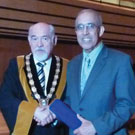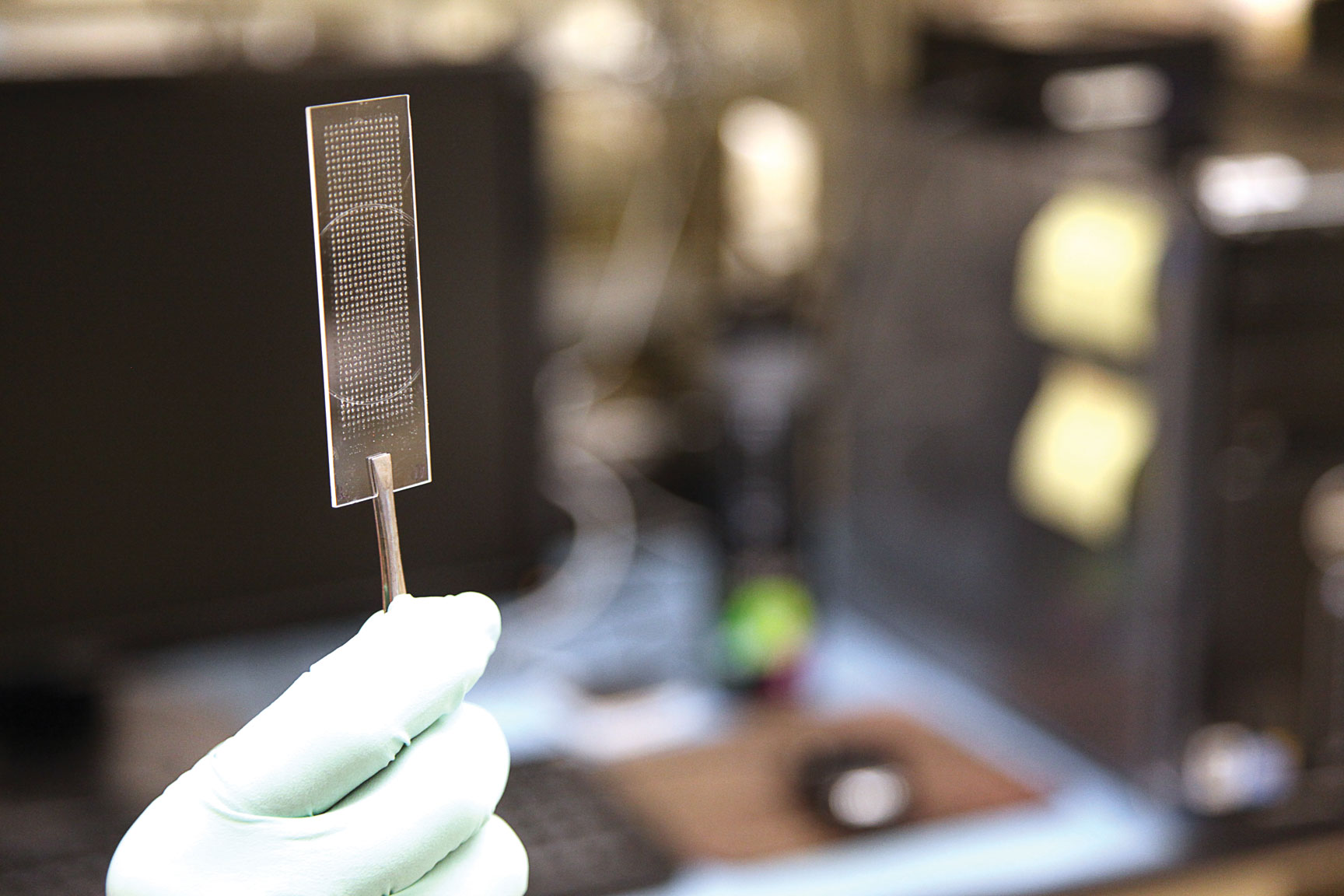News Bytes

Charging Station of the Future
Shuo Wang, assistant professor in electrical and computer engineering, has won a NSF CAREER Award for his project titled "Megawatt Electric Vehicle Superfast Charging Stations with Enhanced Grid Support Functionality as Energy Hubs."
He proposes a technical approach for superfast electric vehicle (EV) charging stations for next generation electric vehicles. The high power EV charging station is integrated with different grid support functions and renewable energy sources. It also has improved efficiency and reliability compared with existing technologies. The proposed technical approach will greatly improve the performance of charging stations and power systems. It will reduce the cost of energy and grid infrastructures. The education plan focuses on the integration of research and education. It includes the training of undergraduate, graduate, minority, high school and woman students.
His award is a continuation grant and is based on the availability of funds. The total award amount is $400,000 paid over the course of five years.

No Flaws in Aviation Research
Harry Millwater, department chair and professor in mechanical engineering, received an award from the Federal Aviation Administration (FAA) for a project titled "Probabilistic Fatigue Management Program for General Aviation."
Over the next four years, his research hopes to demonstrate the feasibility of probalistic approaches in order to provide the FAA a validated tool to address the known, unsafe conditions due to fatigue cracking. To accomplish his research goals, Millwater will need to develop a probabilistic fatigue management plan for an actual structural detail or details; develop experience and familiarity with probabilistic approaches within engineering personnel that design, manufacture and maintain general aviation aircraft; enhance the software as needed to work within Original Equipment Manufacturer (OEM) engineering and design systems; and document the Probabilistic Fatigue Management Program (PFMP) development approach to serve as a template for future structural situations.
The FAA awarded Millwater a grant of $1,196,893 to fund his research.

Keeping an Eye on Combat Injuries
Matthew Reilly is a co-primary investigator with Walter Gray on an award from The Army Medical Research and Material Command for a project titled "Sub-Lethal Ocular Trauma (SLOT): Establishing Standardized Blast Thresholds to Facilitate Diagnostic, Early Treatment, and Recovery Studies for Blast Injuries to the Eye and Optic Nerve."
A large gap exists in our understanding of physical mechanisms and the progression of blast-induced ocular trauma. This gap hampers our ability to design effective protective devices, and may contribute to ineffective treatment and rehabilitation of our eyes due to inadequate awareness of potentially vision-threatening injury. Using the Army Institute for Surgical Research's shock tube, Reilly and Gray will experimentally identify injury mechanisms and their progression with increasing blast energy and impulse. The project will be undertaken as a collaborative research effort between personnel from The University of Texas at San Antonio, the U.S. Army Institute of Surgical Research (Ocular Trauma Division), The University of Texas Health Science Center-San Antonio, and the Sponsel Professional Association of San Antonio.
The total award amount for the joint project is $999,795.

Engineering New Stereotypes
Long gone are the ideas that engineers are old men locked away in labs hunched over computers and calculators. The new generation of engineers is outgoing, community minded, and can even be Ms. UTSA. Daniella Lerma broke tradition when she was crowned the first Ms. UTSA from the College of Engineering. Not only did she show the rest of the world that engineers are more than mathematical super heroes, she also became a role model for many aspiring female engineers by showing them that the field encourages diversity and outside interests.
Lerma initially planned to be a doctor and follow in the medical footsteps of her parents. However, after her freshman year, her friend's father, a nuclear and biological chemist, introduced her to the world of electrical engineering which paved the way for her future goals. Now instead of the medical field, she focuses on her dream job of working in the aviation field for a company like Lockheed Martin.
When she isn't fulfilling obligations as Ms. UTSA, Lerma actively participates in numerous student organizations within UTSA and nationally. Lerma is an engineering senator, current vice president of the College of Engineering Student Council, national vice president of the College of Student Councils (Nationwide - NAESC), and a member of the American Society of Civil Engineers, Steel Bridge team, Institute of Electrical and Electronics Engineers, Society of Women Engineers, Go Green Committee, and Business Affairs Committee.
"For the Society of Women Engineers, I recently went to local schools to speak to young women about why they should pursue engineering and why I decided to become an engineer," Lerma said. "I think it is important to raise that kind of awareness."
Her dedication to service and drive to represent the College of Engineering was all it took for Lerma to set her sites on Miss UTSA. Now that she has won the title she is excited to carry on the tradition of excellence that comes with the crown.

Advancing Engineering with Honors
Mo Jamshidi, Lutcher Brown Endowed Chair Professor in Electrical and Computer Engineering at UTSA, recently received two honorary professorships from Obuda University in Hungary on September 3, 2012 in Budapest. There he was recognized for his work on system of systems engineering and its global reach for technologies of cyber-physical systems, i.e. technology of iPhone, iPAD, Smart Grid, etc.
Additionally, on November 30, 2012 he received his fifth honorary professorship from the University of Birmingham, U.K., the third-most prestigious institution in the U.K., for his work on intelligent control and sensing of cyber-physical systems.
Jamshidi's other honorary professorships come from Nanjing Aeronautical and Astronautical University, Nanjing, China; East China Normal University, Nanjing, China; and Deakin University, Melbourne, Australia.

